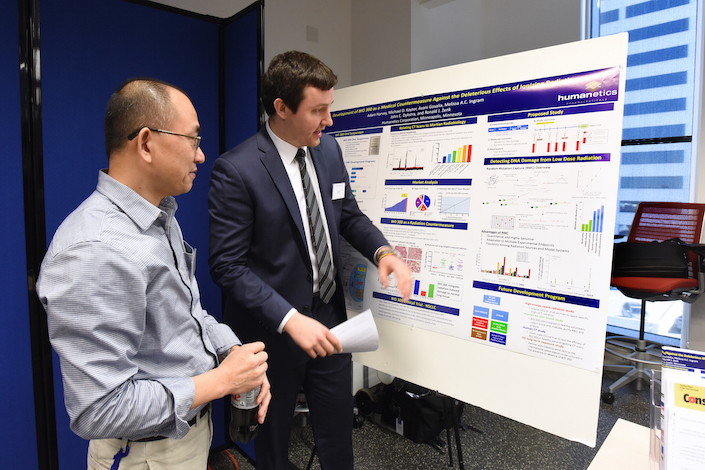Humanetics Corporation

A NASA radiation scientist learns about BIO 300 and discusses the proposed BioShield 4 Mars project with Adam Harvey of Humanetics.
Humanetics Corporation will use the BioShield 4 Mars grant from NSBRI to evaluate BIO 300, a uniquely formulated isoflavone derived from soy, as a radio-protectant in animals exposed to high energy proton radiation. The company has already evaluated BIO 300 extensively using lower energy conventional radiation. This new study will test the efficacy of BIO 300 against exposures that more closely resemble space radiation. The company is utilizing the expertise of NSBRI and NASA scientists to design the study protocol.
BIO 300 is currently being evaluated in a Phase I/II clinical trial in non-small cell lung cancer patients receiving chemoradiation therapy to assess its safety and efficacy in protecting healthy tissues with a goal of improving quality of life for these patients. Additionally, Humanetics believes that BIO 300 may mitigate the impact of accumulated radiation effects in patients exposed to multiple diagnostic procedures such as computed tomography (CT) scans.

Jennifer Riley and Dr. Paul Okunieff of Entrinsic Health Solutions provide a sample of enterade® to a Texas Medical Center radiologist.
Entrinsic Health Solutions, Inc.
The BioShield 4 Mars grant awarded to Entrinsic Health Solutions, Inc. (EHS), will support a Phase II clinical trial of enterade® in patients undergoing myelo-ablative treatment with melphalan, a radiation mimetic, prior to bone marrow transplant. enterade®, is an amino acid-based, medical food beverage that hydrates, rebuilds, and protects the gut lining and helps manage certain side effects of radiation as well as chemotherapy. The Company’s proprietary Amino Acid Coupled Transport (A2CT) Technology uses select amino acids to facilitate active transport of electrolytes throughout the body delivering rapid hydration, decreased gut permeability and improved nutrient absorption thus supporting long-term digestive health. EHS is evaluating enterade in multiple clinical trials for both oncology and digestive health applications.





